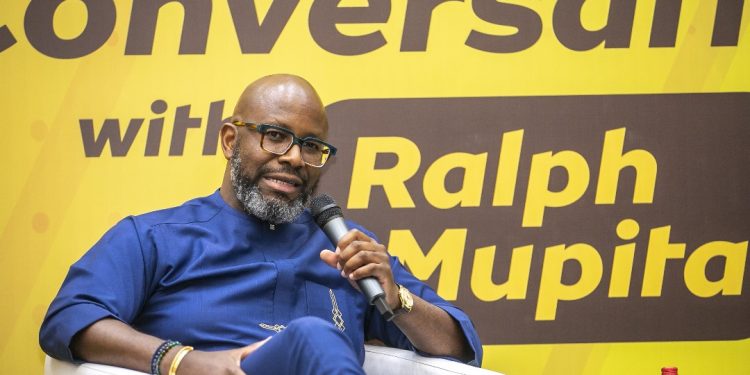Ghana is steadily losing ground in the race to adopt fifth-generation (5G) mobile technology, despite being one of Africa’s most dynamic telecom markets.
MTN Group President and Chief Executive Officer (CEO), Ralph Mupita, has urged the government to fast-track the rollout of 5G services, warning that prolonged delays will undermine the country’s competitiveness in the digital economy.
Speaking in Accra during his participation in the Bright Conversation series as part of a two-day working visit, Mupita stressed that Ghana has become the only major MTN market across Africa without 5G connectivity.
“All over the world, the big thing is about getting high quality connectivity to the whole. Ultimately, we have to get to 5G,” he declared.
Govt’s 5G plan and stumbling blocks
In May–June 2024, the government unveiled the Next-Gen InfraCo (NGIC), a public–private partnership designed to build shared infrastructure for both 4G and 5G under a Network-as-a-Service (NaaS) model.
The partnership includes Ascend Digital, K-NET, Radisys, Nokia, Tech Mahindra, and Ghana’s existing mobile network operators. NGIC was granted a 10-year exclusive license until 2034, effectively giving it a monopoly over 5G deployment.
The exclusive arrangement was supposed to accelerate deployment by pooling resources, expanding coverage, and lowering costs.
On November 1, 2024, the government staged a high-profile ceremonial launch of 5G. But the event proved largely symbolic. No commercial 5G service was rolled out to the public, and Ghana’s deadline for actual deployment slipped repeatedly.
An initial December 2024 deadline was missed, followed by January 2025, then May 2025, and finally June 2025.
By July 2025, a visibly frustrated government issued an ultimatum: NGIC must roll out at least 50 operational 5G sites in Accra and Kumasi by the fourth quarter of 2025, or risk losing its exclusive license.
Missed opportunities of delayed 5G rollout
The repeated failures to meet rollout deadlines have left Ghana lagging behind its peers and missing critical opportunities.
While South Africa and Nigeria are moving ahead with nationwide 5G deployments, Ghana remains stuck in limbo.
Education and digital inclusion
The absence of 5G is deepening Ghana’s digital divide.
Mupita explained that high-speed, low-latency 5G networks would enable fixed wireless access, giving households affordable broadband for online education, remote learning, and digital literacy.
In an era where education delivery is increasingly shifting online, Ghanaian students risk being left behind.
MTN’s push for spectrum allocation
Mupita was clear about what is needed for progress. “You probably need 100 megahertz of 2,500 band spectrum, and 20 to 40 megahertz of 700 band spectrum,” he explained.
With those allocations, Ghana could power industrial applications, cloud services, and consumer broadband.
He noted that across MTN’s major markets, these spectrum allocations have already been made.
“The only major market that we don’t have is in Ghana. And we’ve done a lot to improve on 3G and 4G. But ultimately, we have to get to 5G.”
Mupita stated that MTN remains in discussions with Ghanaian regulators over the availability of spectrum, but the delays underscore broader systemic issues: sluggish decision-making, bureaucratic red tape, and regulatory uncertainty.
Connectivity as a national imperative
Mupita emphasized that high-quality connectivity is now a national imperative.
“Fixed wireless access generally needs 5G spectrum, 5G Customer Premise Equipment (CPEs), a hybrid of a 5G modem and a Wi-Fi router, to drive a good customer experience of digital services in the home,” he explained.
MTN’s goal, he added, is to support households with remote learning, entertainment, and work-from-home options.
“MTN needs 5G to really, really do that. And we have seen it play out in markets like South Africa and Nigeria. There’s no reason why Ghana should not have it.”
Industrial competitiveness
Industries that rely on automation and data-intensive processes are disadvantaged by the lack of 5G.
Citing mining as an example, the MTN Group CEO said 5G enables real-time monitoring, high-safety operations, and logistics optimization.
Ghana, a mining powerhouse, is unable to exploit these innovations. Manufacturing, refineries, and transport logistics also remain stuck on older networks.
Economic growth and investment
Without 5G, Ghana risks losing out on foreign direct investment (FDI).
Multinationals prefer markets with advanced digital infrastructure to support operations and innovation.
Neighboring Nigeria and South Africa are already attracting tech startups, fintech expansion, and global technology partnerships on the back of their 5G deployments.
Healthcare and smart services
Telemedicine, remote diagnostics, and smart city infrastructure all depend on the bandwidth and low latency of 5G.
With healthcare already under strain, Ghana’s inability to deploy 5G limits innovation in health delivery, while smart transportation and surveillance systems for urban management remain aspirational.
The contrast with Ghana’s peers is stark.
Nigeria
In 2021, Nigeria’s Communications Commission licensed MTN Nigeria and Mafab Communications to deploy 5G.
By September 2022, MTN Nigeria launched commercial 5G in Lagos, Abuja, and Port Harcourt.
Today, 5G services are available in dozens of cities, supporting fintech growth and new digital services.
South Africa
MTN South Africa and Vodacom launched 5G commercially in 2020, using both mid-band and high-band spectrum.
The country is leveraging 5G in industrial applications, particularly mining and manufacturing, enhancing its global competitiveness.
Kenya
Safaricom rolled out 5G in 2022 and expanded services in 2023, integrating 5G into its financial services and mobile money platforms.
The East African nation is positioning itself as a regional tech hub, in part by ensuring its connectivity infrastructure matches its ambitions.
Ghana, by comparison, has one of Africa’s most advanced mobile penetration rates, but its absence of 5G puts it at a serious disadvantage.
The cost of delay can be measured in three key areas.
Jobs and productivity
5G supports new jobs in digital services, from app development to cloud computing.
Every year of delay means fewer jobs created in the knowledge economy.
Foreign direct investment
Investors are attracted to markets with cutting-edge infrastructure.
The absence of 5G makes Ghana less appealing compared to peers, reducing inflows of capital.
GDP Growth
The World Bank has linked broadband expansion to GDP growth. Countries with faster internet adoption tend to grow more rapidly. Ghana risks a slower growth trajectory without 5G













